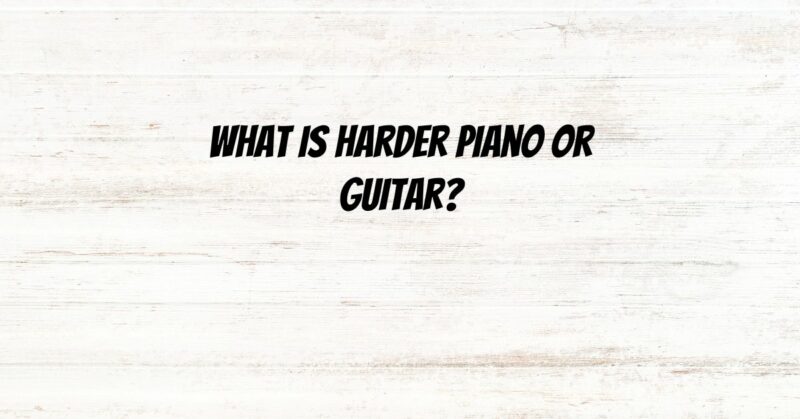The world of music is vast and diverse, offering a multitude of instruments to choose from. Two of the most popular instruments, the piano and the guitar, often pique the interest of aspiring musicians. But which one is harder to learn? The answer to this question is multifaceted and depends on various factors. In this article, we will compare the challenges associated with learning the piano and the guitar, allowing you to make an informed decision based on your personal preferences and goals.
The Piano:
- Instrument Complexity:
- The piano is often regarded as one of the more technically demanding instruments to master. It features a wide range of notes, with both black and white keys, and requires the use of both hands independently.
- Reading Music:
- Learning to read sheet music for the piano can be challenging, as it involves understanding two clefs (treble and bass) simultaneously.
- Finger Independence:
- Piano players must develop finger independence, allowing each finger to strike keys with precision. This requires dedicated practice to build strength and dexterity.
- Coordination:
- Coordinating both hands to play different melodies or rhythms is a fundamental skill for pianists. It can be challenging to achieve this level of coordination, especially for beginners.
- Sustain and Expression:
- Manipulating the sustain pedal and achieving nuanced expression are advanced techniques that can take years to master.
The Guitar:
- Instrument Complexity:
- The guitar, while it has fewer notes than a piano, presents its own challenges. It involves learning to fret notes and chords accurately while coordinating strumming or picking patterns.
- Learning Chords:
- Guitarists must memorize a variety of chord shapes and transitions, which can be challenging for beginners.
- Finger Strength:
- Developing finger strength to press down on the strings and produce clear notes can take time and patience.
- String Bending and Vibrato:
- Advanced techniques like string bending and vibrato require precision and control, often demanding years of practice to master.
- Scales and Soloing:
- Playing scales and soloing, a common aspiration for guitarists, involves learning intricate patterns and developing improvisational skills.
Comparing the Challenges:
- The challenges of learning the piano and the guitar are unique to each instrument. Piano players often grapple with complex finger movements, while guitarists must navigate chord changes and complex fretwork.
- Learning to read sheet music may be initially more demanding on the piano, but both instruments require a deep understanding of music theory and notation.
- The guitar offers more immediate opportunities for creating chord-based accompaniments and strumming patterns, making it accessible to beginners.
- Ultimately, the difficulty of learning either instrument depends on your goals, dedication, and the time you invest in practice.
Choosing the Right Instrument:
- The choice between piano and guitar should align with your musical aspirations and preferences. Consider the style of music you want to play, the instrument’s sound, and your personal motivation.
- If you prefer classical or jazz music and enjoy intricate melodies, the piano may be a suitable choice. If you’re drawn to folk, rock, or popular music, the guitar could be more appealing.
Conclusion:
In the end, whether the piano or the guitar is harder to learn is subjective and depends on your individual circumstances. Both instruments offer unique challenges and rewards, and the right choice is the one that resonates with your passion for music. The key to success in learning any instrument is dedication, consistent practice, and a love for the art of making music.


